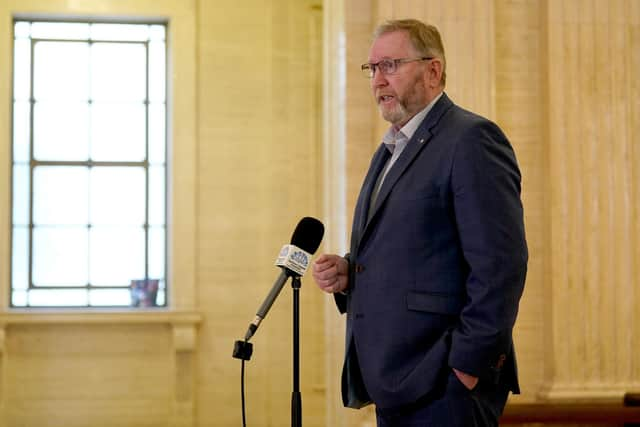Literal decimation: Departments 'facing loss of 10% from budgets' says UUP leader as scale of Northern Ireland's financial crisis brought into focus
and live on Freeview channel 276
UUP leader Doug Beattie said he was left "depressed" by a briefing received by MLAs at Stormont Castle about the state of NI’s finances on Wednesday from the head of the Northern Ireland Civil Service, Jayne Brady.
Former finance minister Conor Murphy said that the outlook is “extremely bleak”, whilst the DUP placed blame for the latest financial crisis at the feet of his party, Sinn Fein.
Advertisement
Hide AdAdvertisement
Hide AdSpeaking after the briefing, Mr Beattie said: “We were talking about an indicative budget, the numbers have been given out and some departments will have to have cuts of up to 10%, and those aren't sustainable.


"It's quite clear that our budget is not going to be able to meet what we need in the next financial year."
It is just the latest budgetary fiasco into which the Province has blundered over the past several years.
Between 2014 to 2016 Sinn Fein blocked a Tory-led revamp of the benefits system, leading to political paralysis and failure to agree a budget.
Advertisement
Hide AdAdvertisement
Hide AdThis was followed by the party walking out of government altogether for three years in January 2017.
With the ongoing collapse of the Stormont Assembly, senior civil servants are running departments in the absence of ministers.
Former finance minister and Sinn Fein MLA Conor Murphy said the UK Government had an opportunity to offset some of the deficit by spreading it over a number of years, but instead opted for a "punishment budget".
"Public services are already on their knees as a consequence of 12 years of austerity, the whole experience of the pandemic," he said.
Advertisement
Hide AdAdvertisement
Hide Ad"What they have taken is the most hard, tough budget possible, which is going to do very, very significant damage."
Mr Murphy also criticised the DUP for its position refusing to participate in devolved government until its concerns around the Northern Ireland Protocol are addressed.
"It's long past time this nonsense ended in relation to the DUP wandering around talking to themselves while the rest of us suffer the consequences," he said.
"We need to be trying to take these decisions ourselves to offset the damage the Tory government are going to do to public services."
Advertisement
Hide AdAdvertisement
Hide AdHowever DUP MLA Gordon Lyons, who served as the economy minister prior to Stormont’s collapse, said: "The reality is that because of the failure to set a budget last year, there was time but the Sinn Fein finance minister failed to get support for a budget, and that meant there was a £300m overspend last year.
"That's now being deducted from this year's budget, and that's what's creating the really difficult financial situation that we find ourselves in.
"You're right in saying that there's a budgetary crisis. But re-entering the executive in and of itself does not fix that – as I've set out there is a £300m shortfall from last year.
"That's an issue that will need to be dealt with one way or the other and it's up to the government to help us out with that."
Advertisement
Hide AdAdvertisement
Hide AdMr Lyons also called on the UK Government for "flexibility" in repaying the overspend.
Deputy Alliance leader Stephen Farry said he expects a budget to be drawn up “towards the end of April”, and that "we believe the only way through this is some form of financial package for Northern Ireland”.
The fresh focus on the Province’s finances comes amid hopelessly failed health targets, and an under-manned police force.
Sir Jeffrey said: “Ultimately, the legislation around the budget will come to Westminster, and we’ll be there to put our case for NI and make the points we need to make in terms of securing the funding that NI needs at this time.
Advertisement
Hide AdAdvertisement
Hide Ad“The Northern Ireland Office needs to look again at their demand that the overspend from last year is repaid this year, normally such matters are dealt with over a longer period of time, and that would ease the pressure on NI departments.
"So we will be engaging with the Secretary of State on the need to ensure that we have a budget that ensures the NI departments are able to deliver the public services that people need here.”
The PSNI currently has about 6,690 full-time officers.
But the chief constable said that “this is 800 officers fewer than the commitment made in the New Decade, New Approach Agreement, and the lowest officer numbers since the PSNI was formed”.
Meanwhile hospital waiting times remain catastrophically off-course.
Advertisement
Hide AdAdvertisement
Hide AdJust as one little snapshot of the problem, in late February health officials said when it comes to inpatient and day case admission, 78.5% (96,018) of patients were waiting more than 13 weeks to be admitted for treatment, and 54.2% (66,302) of patients were waiting more than 52 weeks.
The target is meant to be 55% of patients should wait no longer than 13 weeks, with no patient waiting over 52 weeks.